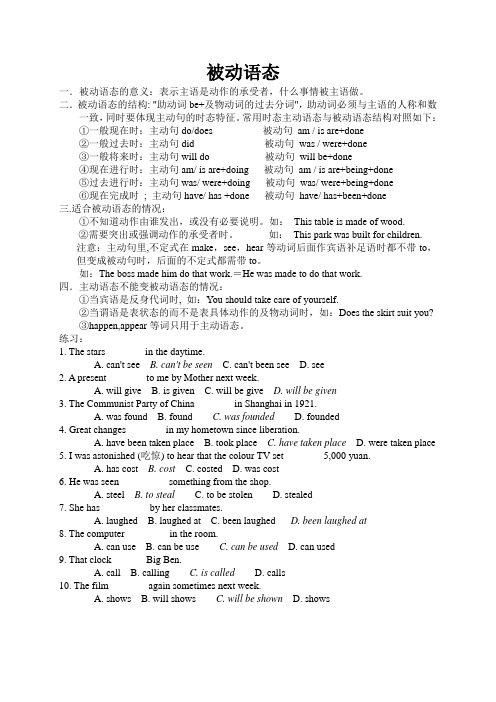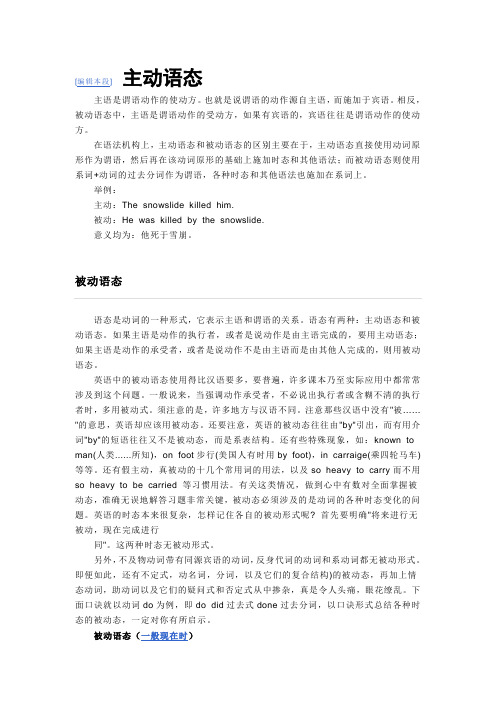主动语态and被动语态结构
六大主动时态和被动语态的结构

b.主+v.过去式
被动 主+was/were+done(过去分词)
标志词:…ago、just now、yesterday、the day before yesterday、last…
3.一般将来时:主动 主+will/shall/+ v.原
被动 主+am/is/are being done(过去分词) 标志词: now,look,listen,at the moment
5.过去进行时:主动 主+was/were+V.ing
被动 主+was/were being done(过去分词)
标志词: at that time,具体的时间点+过去的时间
打造全网一站式需求
欢迎您的下载,资料仅供参考
6.现在完成时:主动 主+have/has done(过去分词)
被动 主+have/has+been done(过去分词)
标志词:already, yet, just,so for,since,for,ever…
翰辰英语涂老师!
学生Cherry.郭昕怡
THANKS !!!
致力为企业和个人提供合同协议,策划案计划书,学习课件等等
主+ (am/is/are)going to+v.原
主+(am/is/are)+Ving(备注:短暂性动词的ing形式)
被动 主+will/shall+be(原型)+done(过去分词)
标志词:tomorrow、next…、the day after tomorrow,
四种常见时态的被动语态

被动语态一.被动语态的意义:表示主语是动作的承受者,什么事情被主语做。
二.被动语态的结构: "助动词be+及物动词的过去分词",助动词必须与主语的人称和数一致,同时要体现主动句的时态特征。
常用时态主动语态与被动语态结构对照如下:①一般现在时:主动句do/does 被动句am / is are+done②一般过去时:主动句did 被动句was / were+done③一般将来时:主动句will do 被动句will be+done④现在进行时:主动句am/ is are+doing 被动句am / is are+being+done⑤过去进行时:主动句was/ were+doing 被动句was/ were+being+done⑥现在完成时; 主动句have/ has +done 被动句have/ has+been+done三.适合被动语态的情况:①不知道动作由谁发出,或没有必要说明。
如:This table is made of wood.②需要突出或强调动作的承受者时。
如:This park was built for children.注意:主动句里,不定式在make,see,hear等动词后面作宾语补足语时都不带to,但变成被动句时,后面的不定式都需带to。
如:The boss made him do that work.=He was made to do that work.四.主动语态不能变被动语态的情况:①当宾语是反身代词时, 如:You should take care of yourself.②当谓语是表状态的而不是表具体动作的及物动词时,如:Does the skirt suit you?③happen,appear等词只用于主动语态。
练习:1. The stars _______ in the daytime.A. can't seeB. can't be seenC. can't been seeD. see2. A present _______ to me by Mother next week.A. will giveB. is givenC. will be giveD. will be given3. The Communist Party of China _______ in Shanghai in 1921.A. was foundB. foundC. was foundedD. founded4. Great changes _______ in my hometown since liberation.A. have been taken placeB. took placeC. have taken placeD. were taken place5. I was astonished (吃惊) to hear that the colour TV set _______ 5,000 yuan.A. has costB. costC. costedD. was cost6. He was seen _________ something from the shop.A. steelB. to stealC. to be stolenD. stealed7. She has _________ by her classmates.A. laughedB. laughed atC. been laughedD. been laughed at8. The computer ________ in the room.A. can useB. can be useC. can be usedD. can used9. That clock ______ Big Ben.A. callB. callingC. is calledD. calls10. The film _______ again sometimes next week.A. showsB. will showsC. will be shownD. shows。
英语的语态分主动语态和被动语态两种

英语的语态分主动语态和被动语态两种。
主动语态的主语是动作的执行者;被动语态的主语是动作的承受者。
1.一般现在时:am/ is/ are + 过去分词eg. English is spoken by Englishmen.2.一般过去时:was/ were + 过去分词eg. The machines were made in China.3.一般将来时:will/shall/be going to be+过去分词eg. A sports meeting will be held in our school next week.4.现在完成时:have/ has been + 过去分词eg. The work has been done by them.5.现在进行时:am/ is/ are being + 过去分词。
eg. A new school is being built in our village.6.过去进行时:was/ were being + 过去分词eg. My TV set was being mended at that time.1.含情态动词的被动语态:can / may / must / should + be + 过去分词eg. He may be sent away from school.2.带动词不定式的被动语态eg. My bike needs to be mended.3.在使用被动语态时,如需要指出动作执行者时,应用“by + 动作的执行者(宾格)”eg. He was called Mike by us4.不及物动词无被动语态(take place/ happen ; last ; rise ; sink ; fall等)eg. The accident was happened two days ago (改错) _________5.当宾语补足语是省to不定式时,在改作被动语态之后,应将省去的to还原。
主动语态和被动语态

在初中的英语学习中,句子语态可以分为主动语态和被动语态两种。
主动语态与被动语态的区别:1.在主动语态中,主语后面接人(be +动词原型);被动语态(be+动词过去分词)2.在主动语态中,主语是谓语动词的使动方。
在被动语态中,主语是谓语动词的受动方。
举例:1.主动语态:The snowslide killed him. 雪崩害死了他。
被动语态:He was killed by the snowslide. 他死于雪崩。
2.主动语态:We use electricity to run machines. 我们用电力来开动机器。
被动语态:Electricity is used to run machines. 电力被我们用来开动机器。
3.主动语态:Bell invented the telephone in 1876.贝尔于1876年发明了电话。
被动语态:The telephone was invented by Bell in1876.电话是贝尔1876年发明的。
主动形式表示被动意义1.连系动词(如:feel,taste,sound,smell,look等)用主动形式表示被动意义。
如:This material feels very soft. 这块材料摸上去很柔软。
This apple tastes good. 这个苹果尝起来很好吃。
2. 有些表示主语内在性质或性能的不及物动词常与一些副词连用,用一般现在时的主动形式表示被动意义,其主语一般为事物。
这些动词有:sell,read, write,wash,wear,last等。
如:The pen writes smoothly 这支笔写起来很流畅。
This kind of food sells well. 这种食物很畅销。
3. 动词need, want, require表示"需要时",后接动名词或不定式的被动式表示被动意义。
如:Your room needs cleaning/to be cleaned. 你的房间需要打扫一下。
熟记各种时态的主动和被动语态的谓语结构 -

过去将来时 主动: would do (一般只用在宾语从 句) 被动:Would be done (一般只用在 宾语从句) 一般将来时 主动: Will/shall do(do代表动词原 形) 被动:Will/shall be done; is/am/are going to be done; Be(is/am/are) to be done; Be about to be done
• • • • • •
将来进行时 主动: Will be doing 被动: Will be being done 将来完成时 主动: Will have done 被动:Will have been done
为更好地满足您的学习和使用需求课件在下载后可以自由编辑请您根据实际情况进行调整
熟记各种时态的主动和被动语 态的谓语结构 (注意:只有及 物动词才有被动语态)
一般现在时 主动:do/does/is/am/are/have/has; 情态动 词(原形)+ 动词原形 被动:is/am/are+done; 情态动词(原形) +be + done 现在进行时 主动:is/am/are+doing 被动:is/am/are+being done 现在完成时 主动: have/has done 被动:have/has been done 现在完成进行时 主动: Have/has been doing 被动:Have/has
一般过去时: 主动:did/was/were/had ; 情态动词 (过去式)+ 动词原形 被动:1)was/were + done 2)情态动词的过去式 + be + 过去分 词 过去进行时 主动:was/were doing 被动:was/were being + done 过去完成时 主动: had done 被动: had been done
被动语态与主动语态

一.语态概述英语中有两种语态:主动语态和被动语态。
主动语态表示主语是动作的执行者。
被动语态表示主语是动作的承受者,即行为动作的对象。
e.g. He opened the door.他开了门。
(主动句)The door was opened.门被开了。
(被动句)二.被动语态的构成被动语态由“助动词be+及物动词的过去分词”构成。
人称、数和时态的变化是通过be的变化表现出来的。
1.一般将来时的被动语态will/ shall/ be to/ be going to +be done2.现在完成时的被动语态has/have been done3.现在进行时的被动语态be +being done歌诀是:被动语态be字变,过去分词跟后面。
三、被动语态的用法(1)不知道或没有必要说明动作的执行者是谁。
e.g. Some new computers were stolen last night.(2)强调动作的承受者,而不强调动作的执行者。
e.g. The window was broken by Mike.窗户是迈克打破的。
四、主动语态变被动语态的方法(1)把主动语态的宾语变为被动语态的主语。
(2)把谓语变成被动结构(be+过去分词)(根据被动语态句子里的主语的人称和数,以及原来主动语态句子中动词的时态来决定be的形式)。
(3)把主动语态中的主语放在介词by之后作宾语,将主格改为宾格。
e.g. I have finished the homework..The homework has been finished by me.歌诀是:宾变主,主变宾,by短语后面跟。
一.单项选择:1. ( ) If the work ________,you can go and play games.A. finishedB. has finishedC. will be finishedD. is finished2.( ) It was raining heavily outside, the children were made______in the classroom.A. stayB. to stayC. stayingD. stayed3. ( ) Kate _______ the letter before her mother came into her bedroom.A. has writtenB. was writtenC. had writtenD. is writing4. ( ) To make our city more beautiful, rubbish ______ into the river.A. needn’t be thrownB. mustn’t be thrownC. can’t throwD. may not throw5. ( ) I like my bike. It ________ very well.A. ridesB. is ridingC. is riddenD. has ridden6. ( ) —I won’t come to the party unless Tom ______, too.—You mean if Tom comes ,you’ll come.A. will inviteB. invitesC. invitedD. is invited7. ( ) Everyone who heardMr. Green’s story _____________ it.A. laughed atB. was laughedC. laughedD. was laughed at8. ( ) The children must _______.A. look afterB. be taken good careC. look the sameD. be taken good care of9. ( ) The woman still doesn’t know what _______ in her hometownwhile she was away.A. happensB. happenedC. will happenD. was happened10. ( ) — I saw you were on foot this morning.—Yes. My bike ___________.A. is mendingB. is being mendedC. is mendedD. is being mending二.用正确的形式填空:1. All the students __________(ask) to bring a kite with them last Sunday.2. Are many ways _______(try) to stop people from cutting down so many trees?3. —What are on show in the museum?—Some photos _________(take) by American children.4. This coat _________(wash) well.5. Must the old people ____________(speak) to politely?6. I’m often _________(警告)not to copy others’ homework.7. He couldn’t e xplain why dinosaurs ___________ (消失).8. I’ll have my bike __________________(修理) tomorrow.9. Have you found your necklace ________(偷) last week?10. The PRC was _________(成立) on October 1, 1949.1。
被动语态和主动语态

[编辑本段]主动语态主语是谓语动作的使动方。
也就是说谓语的动作源自主语,而施加于宾语。
相反,被动语态中,主语是谓语动作的受动方,如果有宾语的,宾语往往是谓语动作的使动方。
在语法机构上,主动语态和被动语态的区别主要在于,主动语态直接使用动词原形作为谓语,然后再在该动词原形的基础上施加时态和其他语法;而被动语态则使用系词+动词的过去分词作为谓语,各种时态和其他语法也施加在系词上。
举例:主动:The snowslide killed him.被动:He was killed by the snowslide.意义均为:他死于雪崩。
被动语态语态是动词的一种形式,它表示主语和谓语的关系。
语态有两种:主动语态和被动语态。
如果主语是动作的执行者,或者是说动作是由主语完成的,要用主动语态;如果主语是动作的承受者,或者是说动作不是由主语而是由其他人完成的,则用被动语态。
英语中的被动语态使用得比汉语要多,要普遍,许多课本乃至实际应用中都常常涉及到这个问题。
一般说来,当强调动作承受者,不必说出执行者或含糊不清的执行者时,多用被动式。
须注意的是,许多地方与汉语不同。
注意那些汉语中没有"被……"的意思,英语却应该用被动态。
还要注意,英语的被动态往往由"by"引出,而有用介词"by"的短语往往又不是被动态,而是系表结构。
还有些特殊现象,如:known to man(人类......所知),on foot步行(美国人有时用by foot),in carraige(乘四轮马车)等等。
还有假主动,真被动的十几个常用词的用法,以及so heavy to carry而不用so heavy to be carried 等习惯用法。
有关这类情况,做到心中有数对全面掌握被动态,准确无误地解答习题非常关键,被动态必须涉及的是动词的各种时态变化的问题。
英语的时态本来很复杂,怎样记住各自的被动形式呢? 首先要明确"将来进行无被动,现在完成进行同"。
英语中的主动语态与被动语态

英语中的主动语态与被动语态英语中的主动语态与被动语态英语中有两种语态即:主动语态和被动语态⼀.概念主动语态:表⽰主语是动作的执⾏者,被动语态表⽰主语是动作的承受者例如:1. Granny takes care of the girl. 奶奶照顾这个⼩⼥孩(Granny是动作take care of 的执⾏者,属主动语态)2. The girl is taken care of by Granny. ⼩⼥孩由奶奶照顾(the girl 是动作take care of 的承受者)⼆.被动语态的构成(1)⼀般现在时的被动语态be 动词(am / is / are)+过去分词(2)⼀般过去时的被动语态was / were + 过去分词(3)⼀般将来时的被动语态will + 过去分词(4)含有情态动词的被动语态Can / may / must / should +过去分词注:在英语中当然不⽌这四种形式的被动语态,它还有现在进⾏时、过去进⾏时、现在完成时、过去完成时等多种形式的被动语态,但在中考中只考⽼师呈现的这四种时态的被动语态三.被动语态的⽤法在将被动语态变为主动语态时,⾸先划分句⼦成分找出句⼦的主语、谓语、宾语,然后将主动语态的宾语拿来做被动语态的主语;接下来看这个句⼦是什么时态,这个句⼦是什么时态就⽤什么时态的被动语态;最后⽤by将主语引出,有时by短语可省略例如:将下列句⼦变为被动语态1.We call him Tom.主谓宾He is called Tom by us.2.Many people speak English.主谓宾English is spoken by many people.3. I asked her some questions.主谓宾She was asked some questions by me.4.She made her room clean and tidy. 主谓宾Her room is made clean and tidy. 5. They took care of the children.主谓宾The children were taken of by them.6.Lucy and Lily will plant many treesMany trees will be planted next Sunday by Lucy and Lily.7.Jim can play the piano.主谓宾The piano can be played by Jim.三.带有双宾语的句⼦被动语态的变法带有双宾语的句⼦变为被动语态时,⾸先划分句⼦成分找出句⼦的主语、谓语、直宾(⼈是直宾)和间宾(物是间宾),然后主动语态中的直宾和间宾都可⽤来作被动语态的主语,接下来如果是将间宾⽤来作被动语态的主语时,还须在直接宾语前加to 或for注意:介词to或for 的选择与谓语动词有关:与to 连⽤的动词有:give / show / send / bring / read /pass / lend / leave / hand / tell / return / write / pay / throw / wish / teach / promise等;与for 连⽤的动词有:make / buy / do / fetch / get / play / save / order / find 等. (常考的⽼师打有下划线)例如:1. She sent me a dictionary on主谓直宾间宾my birthday.I was sent a dictionary on my birthday.A dictionary was sent to me om my birthday.2.My father bought me a radio主谓直宾间宾yesterday.I was bought a radio yesterday.A radio was bought for me by my father yesterday.四:省略了带to的不定式的句⼦的被动语态的变法省略了带to的不定式的句⼦在变为被动语态时,在这个省略没to的动词前要将to还原上.(像这样的句型有:make sb dosth / see sb do sth / hear sb do sth / let sb do sth / watch sb do sth / notice sb do sth等)例如:1. The story made us laugh.主谓宾We were made to laugh by the story.2. The boss makes the workers work 12主谓宾hours a day.The workers are made to work 12 hours a day by the boss.3. I saw the boy play soccer on the主谓宾将下列句⼦改为被动语态1.We plant trees every spring.2.Many foreigners visit the Great Wall every year.3.Lily and Lucy cleaned the classroom yesterday afternoon.4.Most students like Mr. Wang.5.Many people will visit Beijing next year.6.They use wood to make paper.7.Ann looked after the children well.8.Lily invited me to her birthday party last Sunday.9.A writer translated the book into many languages several years ago.10.My brother can work out the math problem easily.11.We should change clothes often to keep healthy. 12.Scientists may clone humans some day.13.People mustn’t throw rubbish into the river.14.Must we plant more trees to protect the environment?15.Did he plant many trees last year?16.Will she visit Beijing next Sunday?17.Jenny put her clothes in the suitcase yesterday evening.18. Tom saw his sister walk into the room just now.19. We must plant many trees and flowers in our hometown every year.20. He can make paper ships.21. Jane will watch TV tomorrow.22. Though the earthquake destroyed many house, people didn’t lose hope.23. Lily often heard her sister sing in the next room.24. I noticed him read a novel in class.25. The teacher made us understand it. ( ) 26. _ Our hometown is becoming more and more beautiful. _ Sure, many trees ____ every year.A. plantB. is plantC. are plantedD. planted( ) 27. In July, 2016, the 30th Olympic Games _____ in London.A. will be held( ) 28. The task ____ in an hour. Then we can go home and have a good rest.A. was finishedB. will be finishedC. has been finishedD. can’t be finished ( ) 29. _ Where is Betty?_ She ____ on the playground a few minutes ago.A. was seenB. sawC. is seenD. is seeing( ) 30. More than 20 schools ____ in the country next year.A. are builtB. were builtC. have builtD. will be built ( ) 31. Many people learn English because it ____ widely ____ in the world.A. is, usedB. was, usedC. is, usingD. was, using( ) 32. _ People say the subway ____ building in Harbin in a few years.A. will finishB. is finishedC. will be finishD. finished( ) 33. Old people must _____.A. be spoken to politelyB. speak to politeC. be spoken politelyD. speak polite( ) 34. _ What’s wrong with your leg?_ I _____ by a bike when crossing the road.A. hurt( ) 35._ I have some good news to tell you.You _____ as a volunteer for themeeting._ Really? I can’t believe it.( ) 36. _ The shirt looks different from others and it looks nice._ Thanks. It _____ by my mother last month.A. madeB. is madeC. was madeD. makes( ) 37. The young man was often seen_____ by the lake.A. to drawB. to drawingC. drawD. drew( ) 38. _ There is a lot of wind in North China._ Well, more trees ____ every yearto stop the wind.A. must be plantedB. can plantedC. should plantedD. should plant ( ) 38. A lot of meetings were ____ because of the dangerous disease. A. turned off B. set offC. put offD. taken off( ) 39. _ Do you often clean your classroom?_ Yes, our classroom ____ every day.A. cleanB. cleansC. is cleanedD. was cleaned ( ) 40. Don’t worry. You ____ plenty of time to decide.A. will give4。
- 1、下载文档前请自行甄别文档内容的完整性,平台不提供额外的编辑、内容补充、找答案等附加服务。
- 2、"仅部分预览"的文档,不可在线预览部分如存在完整性等问题,可反馈申请退款(可完整预览的文档不适用该条件!)。
- 3、如文档侵犯您的权益,请联系客服反馈,我们会尽快为您处理(人工客服工作时间:9:00-18:30)。
主动语态:
一般现在时:主语+am/is/are+表语主语+do/does+宾语
一般过去时:主语+was/were+表语主语+did+宾语
现在进行时:主语+am/is/are+doing+…
过去进行时:主语+was/were+doing+…
现在完成时:主语+have/has+done+…
过去完成时:主语+had+done+…
一般将来时:主语+will/shall+do+…
过去将来时:主语+would/should+do+…
被动语态:(be done)
一般现在时:主语+am/is/are+表语主语+am/is/are+done+宾语一般过去时:主语+was/were+表语主语+was/were+done+宾语现在进行时:主语+am/is/are+being+done…
过去进行时:主语+was/were+being+done…
现在完成时:主语+have/has+been+done…
过去完成时:主语+had+been+done…
一般将来时:主语+will/shall+be+done…
过去将来时:主语+would/should+be+done…
主语+系动词+表语
系动词(1.be动词—am/is/are was/were been
2.感官类系动词—look、taste、smell、sound、feel +adj. 3/4/5/6……)表语(+n/adj./介词短语/地点副词)
I am a Chinese.
She is nice.
He is in this room.
They are here.
情态动词(can/must/need/will/should/would/shall+do)
情态动词被动(can/must/need/will/should/would/shall+be done)。
